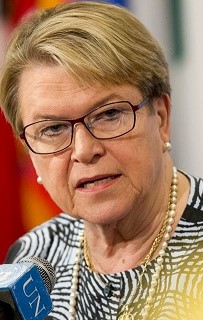 The UN Security Council is today holding a meeting to discuss the situation in South Sudan, even as the members of the Council say that the political process in country needs to be reinvigorated.
The UN Security Council is today holding a meeting to discuss the situation in South Sudan, even as the members of the Council say that the political process in country needs to be reinvigorated.
“(The) Secretariat would develop a comprehensive political strategy, in close consultations with the African Union (AU) and Intergovernmental Authority on Development (IGAD), to achieve a cessation of hostilities and bring the parties back to an inclusive political process,” the SG said earlier, lamenting that efforts to bring the warring parties together had not achieved the desired outcome.
The meeting takes place when the political, security and humanitarian situation in the country is still volatile, marked by escalating inter-communal violence and hate speech that have aroused concerns that, if the country continues on its current course, it could lead to genocide. Fighting continues to escalate in the Equatoria region, Upper Nile, Unity and Western Bahr el-Ghazal states.
Council members will want to find out what UNMISS and other actors are doing to counteract the hate speech. In a media briefing in Juba at the conclusion of a recent trip, Special Adviser for the Prevention of Genocide Adama Dieng said that what he had “seen and heard here has confirmed my concerns that there is a strong risk of violence escalating along ethnic lines, with the potential for genocide.”
He expressed concern about hate speech, propagated through the media (including social media), as well as through letters that had recently been circulated. Dieng said that the situation in Yei, where tens of thousands of people have been displaced by violence in recent months, “merits a full scale fact-finding investigation and enhanced humanitarian support.”
According to a brief from the UN, the meeting will be attended Under-Secretary-General for Peacekeeping Operations Hervé Ladsous, Head of UNMISS and Special Adviser for the Prevention of Genocide Adama Dieng. Ambassador Fodé Seck of Senegal, the chair of the South Sudan Sanctions Committee, is also expected to brief the Council on the work of the sanctions committee.
Another issue for discussion will be the restrictions imposed on UNMISS’s operations and on humanitarian actors by the Transitional Government of National Unity (TGoNU). This has been a major area of concern for Council members. The Council is concerned that the government’s commitments to remove impediments to movement have not translated into concrete results.
Targeted sanctions and arms embargo
The Council will also discuss the deployment of a Regional Protection Force as per Security Council resolution 2304. Little progress has been made in this respect with the TGoNU shifting goal-posts every now and then, with regard to its role vis-à-vis the role of UNMISS and the RPF.
Members of the Security Council would like to know what measures the Secretariat will take to secure troop contributions to substitute for the Kenyan pledge to RPF, and to replace the Kenyan peacekeepers leaving the mission. Kenya recently announced that it will not take part in the RPF and that it will withdraw its soldiers from UNMISS, to protest against the UN’s decision to sack the Kenyan commander of UNMISS.
Ambassador Seck, the chair of the Sanctions Committee, is expected to provide a summary of the mid-term report of the committee’s Panel of Experts, which in an earlier report gave recommendations for targeted sanctions (i.e., assets freezes and travel bans) on key political players and for an arms embargo on South Sudan.
However, strong divisions remain within the Council on the use of targeted sanctions or arms embargo. While most Council members appear to support an arms embargo, veto-wielding permanent members China and Russia appear to be strongly opposed to an arms embargo.
The UN says there are now 1.73 million internally displaced people in South Sudan. Approximately 1.05 million refugees have fled from South Sudan to neighboring countries since the start of the civil war in December 2013. Approximately 4.8 million people in the country suffer from severe food insecurity, amidst a dire economic crisis which has resulted in a current inflation rate of over 660%.
The replacement of Ellen Margrethe Løj as head of UNMISS will also feature during the discussions. She is set to leave office at the end of November. She has been the UNMISS chief since 2014.


